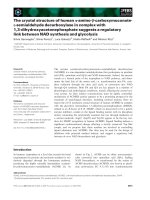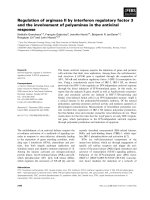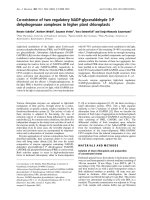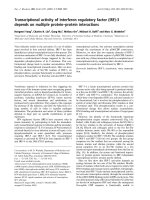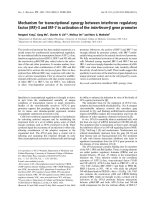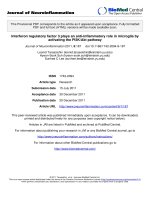3 Regulatory Training
Bạn đang xem bản rút gọn của tài liệu. Xem và tải ngay bản đầy đủ của tài liệu tại đây (350.19 KB, 66 trang )
Regulatory Training
Module 3
Objectives
Money laundering
Complaints & Compensation
Retail Distribution Review
Fit & Proper
Treating customers fairly
Money Laundering
Money Laundering
To prevent the use of financial systems for money
laundering purposes
1989, the Financial Action Task Force on Money
Laundering (FATF) was created
An international body dedicated to the fight against
criminal money, 30 members including the
European Commission and many of the EU
member states
Money laundering can be defined as
‘Terrorist property’
Money or other property that is likely to be used for
terrorism purposes or proceeds of the commission
of acts of terrorism
Proceeds of acts carried out for the purposes of
terrorism
Definitions
Money Laundering can be defined as
the process of filtering the proceeds of criminal activity
through a series of accounts
or other financial products
in order to give it apparent legitimacy
or to make its origins difficult to trace
Legislation
Proceeds of Crime Act 2002
Deals with the laundering of the proceeds of all
forms of crime - drug money is no longer separate
The Act extends the obligation to report suspicions
about money laundering of proceeds of all forms of
crime - previously restricted to drugs or terrorism
offences
Three main areas to address:
1 - Concealment or disguise
• The true nature, source, location, disposition,
movement, rights with respect to or ownership of
property,
• knowing that such property was derived from
criminal activity or from an act of participation in
such activity
2 - Acquisition, possession or use of property
Knowing, at the time of receipt, that such property was
derived from criminal activity or from an act of
participation in such activity
3 - Participation in, association to commit
Attempts to commit and aiding, abetting, facilitating and
counselling the commission of any of the actions
mentioned
Two important definitions, in order to clarify the
definition of money laundering:
Property
Assets of every kind, tangible or intangible , movable or
immovable, as well as legal documents giving title to such
assets
Criminal activity
A crime as specified in the Vienna Convention
(the United Nations Convention Against Illicit Traffic in
Narcotic Drugs)
and any other criminal activity designated as such by each
member state
Money Laundering offences
Three principal money laundering offences:
Concealing criminal property
Arranging
Acquiring, using or possessing
These lead to procedures designed to ensure that
persons working in the financial services industry
do not become ‘involved’ in money laundering
Report suspicious circumstances
Refrain from alerting persons being investigated
Give regular training to staff about what is expected
of them under money laundering rules including
consequences of failure to comply
Appoint a money laundering reporting officer
This post is a controlled function, and must be
filled by a person of ‘appropriate seniority
Requisition a report at least once in each calendar
year from the money laundering reporting officer.
This report must assess the firms compliance with
Money laundering procedures and provide
information about reports of suspected money
laundering incidents submitted by staff during the
year
The Financial Action Task Force
Established in 1989 - To co-ordinate the
international fight against money laundering
Main office in Paris
Similar bodies around the world also operate as
Associate members of the FATF or have observer
status with the FATF
Serious Organised Crime Agency
(SOCA)
Public body sponsored by the Home Office
Has law enforcement powers
Responsibility to reduce the impact of serious
organised crime on people and communities
Includes pursuing and recovering the proceeds of
crime
Offences
Two particularly relevant to financial advisers
Failure to disclose
All suspicions of money laundering must be
reported to the authorities.
The proceeds of Crime Act 2002 introduced the
requirement for a person to disclose information
about money laundering if they have reasonable
grounds for knowing or suspecting that someone
is engaged in money laundering.
Tipping off
It is also an offence to disclose to – or tip off- a
person who is suspected of money laundering
that an investigation is being, or may be, carried
out
Client identification
Most important element in the action against Money
Laundering.
Evidence of identification is required in the following
cases:
When entering into a new business relationship
(new account, investment or policy)
In the case of all new customers
ID must be obtained in every case and where there is
a suspicion of money laundering
Acceptable forms of ID include:
Current passport
National identity card with photograph
Driving licence with photo
Entry on electoral roll
Recent utility bill or council tax bill
Financial exclusion
What if a client can not produce ID?
In such circumstances the FSA considers that a firm
may accept , as evidence of ID
A letter or statement from a person in a position of
responsibility
i.e. Solicitor, doctor or minister of religion who
knows the client
Record-keeping requirements
Institutions must keep appropriate records for use as
evidence in any investigation into money laundering.
This means that
Evidence of ID must be retained until at least five years
after the relationship with the customer has ended
Supporting evidence of transactions (in the form of originals
or copies admissible in court proceedings) must be retained
until at least five years after the transaction was executed
Reporting procedures
Each firm must appoint a MLRO
All members of staff must make a report to the
MLRO if they know or suspect that a client is
engaged in money laundering
The MLRO will then determine whether to report
this to SOCA using known information about the
financial circumstances of the client and the nature
of the business transacted
Training requirements
Firms are required to
Take appropriate measures to make employees
aware of money laundering procedures and
legislation
Provide training in the recognition and handling of
money laundering transactions



